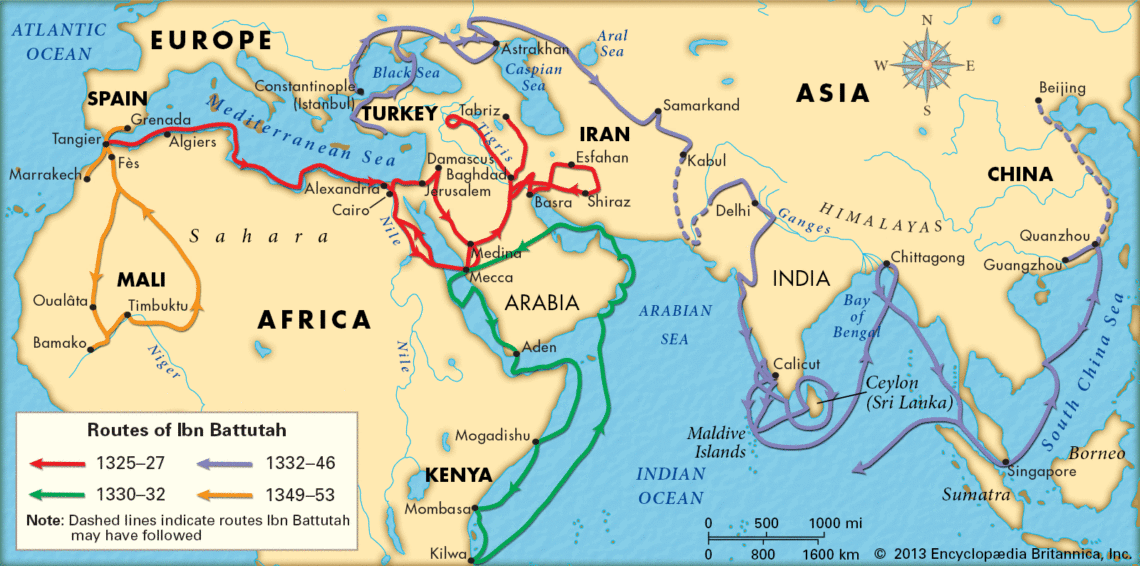
Setting Sail: Tales of an Academic Nomad
Travelling – it leaves you speechless, then turns you into a storyteller.
Ibn Battuta
From its vantage point atop the Kasbah in Tangier, Morocco, the Ibn Battuta museum overlooks the meeting point of the Atlantic Ocean and the Mediterranean Sea—a vista coloured by myriad beginnings and a few endings as well. More of a memorial than a museum, the site commemorates the legendary journeys of a scholar whose travels kindled cross-cultural and arguably inter-civilisational dialogues.
Though trained as a jurist and later serving as a judge, Abu Abdullah Muhammad Ibn Battuta is best known for the odysseys he undertook. Over three decades, he mapped vast expanses of the African and Asian continents, clocking tens of thousands of miles by boat, camel, and on foot. His focus: to cultivate a profound understanding of the juridical sciences. His quests blurred geographic and cultural lines as he pursued intellectual exchanges with peoples interspersed across a variety of juristic traditions. While these exchanges began firmly within the realm of Islamic law, they widened both in theory and tradition as he trekked further. Amongst the peoples he encountered, Ibn Battuta was not just recognised but revered, personifying the twin flames of exploration and kinship that have enriched African and Asian interchanges for centuries. The museum is a tribute to these voyages, mesmerising visitors with his legacy of exploration and, for the legally-minded, his pioneering juridical insights.
Yet, amidst the museum’s tapestry of history, there exists a void—a bridge to be built between yesteryears and today. Limited to stories from the 14th century CE and thereabouts, visitors are regaled with a powerful historical record, albeit one that impresses rather than inspires. When leaving the museum, guests can be forgiven for perceiving his achievements as a historic tour de force, to be admired from afar through maps and artefacts. While deliberate in curation, this omission in the exhibition feels like a lessening of the scholar’s legacy.
To me, Ibn Battuta’s magnum opus, “A Masterpiece to Those Who Contemplate the Wonders of Cities and the Marvels of Travelling,” is more than just a travel diary. He produced a philosophical guide—a template for a cooperative and culturally aware approach to research, one of particular relevance for the practice and teleology of international law. Ibn Battuta’s approach to learning, fostered through open-minded exploration and immersive experiences in diverse cultures, encourages a rich understanding of interconnected traditions and shared human experiences. It is more of an ethos about the nature of knowledge and discovery that positions itself as a counter-narrative to paradigms rooted in chauvinism and epistemic violence, and one that fellow (legal) scholars might wish to emulate.
While I am poised to probe deeper into his method in an upcoming project, contextualising its resonance on possible futures for international law, for purposes of this blogpost, I wish to comment on something more intimate. Alongside Malcolm X, Samir Amin, and CLR James, Ibn Battuta is one of the scholars who has most shaped my academic trajectory and guided my next career move.
* * *
Like many critical idealists before me, I have found myself both drawn to the potential of international law and disillusioned by its reality. From my formative years in law school, it was evident the global legal order had deep fissures: a wide chasm separated the explorative spirit that fuelled Ibn Battuta’s journeys from the imperialistic overlays of the international legal system I studied. This disparity birthed a question that has since consumed my thinking: what if international law had been modelled after Ibn Battuta’s curiosity about and respect for diverse societies? Would our understanding and practice of international relations—and even our very concept of nation-states—have been different? It is a counterfactual I reflect upon more and more and one that contrasts sharply with the reality: a model of international law tainted by Columbus’ expeditions of plunder, eradication, and assimilation. The violence of conquest rather than the courage of the compass haunts our discipline.
Readers familiar with my writings will recognise in these reflections a signature blend of hope and melancholy: a fervent belief that international law can ascend to higher ideals, counterbalanced by the awareness that hope often sprouts as a refuge for the desperate, maybe the vanquished. This duality has driven my career, resulting in a series of academic appointments across continents as I sought to engage with diverse legal traditions, to probe the potential for a progressive turn in international law.
Coincidentally, most of the institutions I was affiliated with were well suited for this form of investigation, sharing a unique commonality: all were ensconced within settler colonies—from Barbados and Canada to New Zealand and Northern Ireland. While the afterlives of the Barbadian plantocracy differed dramatically from the sectarian impulses that coloured the island of Ireland, both contexts were shaped by the colonial era, amplifying in my thinking Columbus’s influence and Ibn Battuta’s absence in international law.
To illustrate, I discovered while at the University of the West Indies that Caribbean aspirations for international law were hampered by a slavish commitment to colonial structures. Fanon’s insights rang loudly: the post-colony is often stricken with imperial-envy, producing behaviours that mirror the pathologies of colonial powers. A brief foray into the practices of Caribbean states at the UN—not to mention of educational institutions in the region—validates Fanon’s cautionary notes about comprador classes and elite capture. During my deanship, I observed how these dynamics snuffed out the imagination of the young, precipitating disaffection at one end and departure at the other, conditions that preclude the cognitive and social transformation a post-colony demands.
Conversely, the University of Auckland was both better and worse. On the bright side, a vibrant Maori renaissance is sweeping through Aotearoa. This upheaval goes well beyond cultural displays such as the haka, with mauri permeating the fabric of Kiwi society and challenging ideas about, for example, criminal (in)justice, resource management, land ownership, and cross-border solidarity. In legal education, this renaissance catapulted interest in Tikanga and other indigenous perspectives on law, offering students genuine alternatives to the colonial apparatus. Some institutions, such as the University of Waikato and Auckland University of Technology, even experiment with what this change means for teaching and research. Nonetheless, on the not-so-bright side, a prevailing neoliberal approach to tertiary education, even in the broader New Zealand societal structure, rendered support for radical research superficial—more of a nod to the trend than genuine commitment.
Perplexed by the contradictions of the post-colony, I eventually shifted to a metropole, accepting appointments at the University of Warwick and UCL. Inspired by the experience of other Third World scholars, I thought I could better understand the colonial condition from the vantage point of the centres of power (or the belly of the beast as I am known to say). If legal imagination felt stunted in settler-colonial spaces, the constraints were even more palpable within English institutions. From publishing mandates to ranking considerations, the pressures of academic expectations seemed to erode radical trajectories in legal thinking. Much like how empires focused on conquering territories, modern British academia is fixated on conquering quantitative metrics, often at the expense of deeper, qualitative exploration. Even the most progressive academics are compelled to prostrate before the demands of publishers, granting agencies, and league tables, priorities that denude legal research and pedagogy of counter-hegemonic potential. This makes sense, of course, since empire was always a hegemonic endeavour. Of course, these compulsions are anathema to the goals of education, exacerbating the cleavages in British academia that bludgeon non-conforming or avant-garde thinkers.
It is worth mentioning that Ibn Battuta barely bothered with Europe, limiting his forays into Andalusia and the Balkan Peninsula, Muslim lands at the time. Having set his sights on traditional centres of academia, he sought out the scientific minds of African and Asian civilisations. In hindsight, he was saner than I. While reflecting on the disparities between Columbus and Ibn Battuta, both in Britain and its satellites, the academic realm and international legal scholarship appear to mirror these dichotomies. Institution and state fetishise destinations ahead of journeys, foisting upon academics a careerist impulse that conflicts with an essence of exploration. We rush headstrong toward publications and promotions, justifiable goals in a sector that is increasingly fragmented by the insecurity that neo-managerial logic demands. Columbus epitomised this mindset, with his outlook ultimately paving the way for the transatlantic slave trade, colonialism, genocide, and mammon, brutal practices that he approached with an instrumentalist attitude.* Ibn Battuta, by contrast, exemplified genuine exploration—every interaction with others brought him knowledge, enhancing his and our appreciation of humanity in its many shades and layers. Alas, while Ibn Battuta’s spirit roams the narrow roads of the Kasbah, it is the conquistador’s influence that guides international law and legal academia.
Whenever I find myself confronted by this disparity, I revisit his masterpiece. It serves as testament that knowledge is an intricate amalgamation of human interactions and informs my own approach toward learning, teaching, and research. By immersing myself in diverse cultures, I have broadened my horizons and enriched my learning in ways that made Eurocentric international law look like a parody. I conclude now with details of the next stage in my academic journey.
* * *
I begin with the obvious irony: today’s blogpost bears traces of Columbus’s self-centredness. My apologies, but it comes with the territory of being an international lawyer, I suppose. The goal, however, was not entirely gratuitous. In monopolising your time and patience, I wish to signal to colleagues a new chapter in my academic career. The Prophet Muhammad once said: ‘seek knowledge even if it you have to go as far as China.’** And so, to China I go, having accepted a role that promises to be as enlivening as Ibn Battuta’s sojourn across the Silk Road.
Starting next month, I am excited to serve as a Reader and the Associate Dean of Learning & Teaching at Xi’an Jiatong-Liverpool University, a place where I anticipate encounters with a confluence of diverse intellectual traditions. XJTLU, I don’t mind admitting, has been on my radar for years. It encapsulates a fascinating fusion between East and West, between Chinese and British approaches to modern pedagogy, and is the epicentre of syntegrative education. There is much for me to learn and, I hope, something for me to contribute as well. Based in the School of Social Sciences and Humanities, I will find myself among colleagues as familiar with Walter Rodney and Antony Anghie, with Tendayi Achiume and Achille Mbembe, as they are with Ibn Battuta. This opportunity sits squarely within my commitment to intellectual exploration and is a helpful reminder that even ageing academics are not bound by the limits of their past but free to chart new courses in pursuit of fresh insights.
Of course, fellow publicists will have noted that China has fast become a centre of international legal debate. Beyond its civilisational import to legal studies, both scholars and state are driving new directions in international economic law, climate change law, and the law of the sea, among others. While this reality might spook Sinophobic Western politicians, it behoves international legal scholars to investigate what this means for the regime more broadly and whether this presents an opportunity for the critical idealists, however bruised and battered we might be. In a legal system structured around an ethno-chauvinist notion of universality, the counterweight to the epistemic violence of international law is a culturally inclusive approach to research. Indeed, in international legal thinking, there is perhaps nothing more revolutionary than genuine recognition and exploration of the epistemologies of non-Europeans.
As I stand on the brink of this new adventure, I am giddy like a child after the school day ends and organic learning begins. Just as children gain much from running along unfamiliar alleys and traipsing through unknown neighbourhoods, the knowledge of an academic spreads wildly when we journey through humanity. While I remain sceptical about international law ever embracing this ethos of discovery, my love of humanity runs far deeper than my sentiments for international law. I will thus set sail once more, eager to experience the limitless expanse of our horizons. Here’s to many more tales, reflections, and learnings that academic nomadism has blessed me with.
I am grateful to family, friends, and colleagues who have helped me along the way. For fear of leaving anyone out, I have opted to exclude everyone from my acknowledgements.
* ‘They … brought us parrots and balls of cotton and spears and many other things, which they exchanged for the glass beads and hawks’ bells. They willingly traded everything they owned… . They were well-built, with good bodies and handsome features…. They do not bear arms, and do not know them, for I showed them a sword, they took it by the edge and cut themselves out of ignorance. They have no iron. Their spears are made of cane… . They would make fine servants…. With fifty men we could subjugate them all and make them do whatever we want.‘
** I am aware some scholars dispute the authenticity of the hadith, limiting it to ‘seeking knowledge is obligatory to every Muslim’. If the hadith was good enough for Ibn Battuta…





